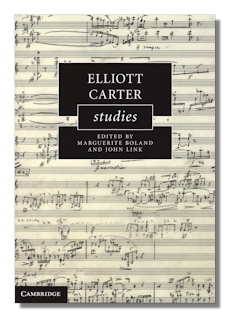
The Internet's Premier Classical Music Source
Related Links
-
Introduction
Acoustics
Ballet
Biographies
Chamber Music
Composers & Composition
Conducting
Criticism & Commentary
Discographies & CD Guides
Fiction
History
Humor
Illustrations & Photos
Instrumental
Lieder
Music Appreciation
Music Education
Music Industry
Music and the Mind
Opera
Orchestration
Reference Works
Scores
Thematic Indices
Theory & Analysis
Vocal Technique
Search Amazon
Recommended Links
Site News
 Book Review
Book Review
Elliott Carter Studies

Cambridge Composer Studies
Marguerite Boland, ed. and John Link, ed.
Cambridge University Press, 2012 pp xvi + 347
ISBN-10: 0521113628
ISBN-13: 978-0521113625
It's gratifying that Elliott Carter, who died last year (November 2012) at the age of almost 104, hasn't so far experienced the temporary eclipse that sometimes happens to composers immediately after their deaths. Carter may well turn out to be one of the "Greats" – certainly of his own time. Recordings continue to be produced (ex., Bridge 9396); as do printed studies (Elliott Carter by James Wierzbicki). And here from Cambridge University Press in their "Cambridge Composer Studies" series is a collection of over a dozen expertly-wrought essays amounting to a highly useful in-depth survey and summary of Carter's achievement.
Although expensive at nearly US$100, Elliott Carter Studies contains a wealth of valuable material. Its four sections of respectively two, six, two and four essays/chapters – each between about 20 and 30 pages in length – deal with: An Overview (17% of the book's substantive content), Analysis and Aesthetics (48%), Sketch Studies (11%) and Music and Text (24%). References are footnotes at the bottom of each page; there is an extensive bibliography of almost a dozen pages; the book is well indexed; this index contains a list of Carter's published, four unpublished and four unfinished works. Despite the presence of multiple musical (score) examples, tables and ten photographic reproductions – mostly of Carter's handwritten manuscripts, and a little hard to read – Elliott Carter Studies is not primarily a reference work, still less a "glossy" book to be dipped into; although it is packed with facts and is attractively produced in the usual CUP manner.
Rather, it's a substantial and authoritative study, a critical evaluation of, and in many ways a historical commentary on, Carter's work and place in musical history. Although other such publications exist, notably David Schiff's The Music of Elliott Carter (ISBN-10 0801436125 ISBN-13 978-0801436123), Marguerite Boland and John Link have here produced a coherent collection of contributions by renowned and respected experts. These bring the study of Carter up to date and take new research (conducted since Schiff's, which is 15 years old now) into account. Perhaps most extraordinarily, focus has shifted towards the work of Carter since the composer's 80th birthday. Implicitly this emphasis underlines just what a remarkable musical figure Elliott Carter was.
Furthermore, the editors situate this book in the context of a perceptibly wider and greater (and, it's to be hoped, growing) interest in Carter… some of the events that evidence this are cited in their Preface. Indeed, the book is predicated in part on the notion that Carter took broader musical trends and made them his own; or at least adapted their principles and priorities to his music: Neoclassicism between the two World Wars, Modernism in the 1960s and 1970s and new directions altogether in the last 25 to 30 years (of Carter's life). The essays by Jonathan Bernard (a superb re-assessment of Carter's early music), John Link (the later music), Arnold Whittall (late modern thematicism), John Roeder (the mature style and place of "polyvocalism") and Max Noubel (the recent music) are particularly illuminating in this respect. No true understanding of Carter's achievement can be had without an appreciation of the immense progress which the composer made in the context of other arts and the changes in those areas in music itself. An essential adjunct is Carter's positive obsession with rhythm: Andrew Mead is particularly good here.
Other essays that can be singled out for their particularly trenchant and perceptive insight are Annette van Dyck-Hemming's examination of Carter's affinity with text, Dörte Schmidt's assessment of the string quartets, and Stephen Heinemann, who writes on melodic invention in the later concertos, "Composing with intervals". Specific genres are explored by Felix Meyer (the unfinished oboe and harpsichord Sonatina), Stephen Soderberg (Carter's Library of Congress sketches), Marguerite Boland (ritornello form in the Boston and ASKO concertos) and Guy Capuzzo on the as yet perhaps unappreciated richness of What Next?.
After careful reading of Elliott Carter Studies, you're likely to be struck by the breadth and depth of Carter's achievement. Although not a book whose primary aim is advocacy, it's hard for those writing from such informed and enthusiastic perspectives not to emphasize his impact, and the scale of his success in so many areas of musical life. Considerations of the wider artistic and cultural world are made throughout. Material has been carefully allotted to contributors; overlap is minimal but where emphasis is necessary from more than one perspective, it's been deftly handled… compositional techniques for instance.
The style of writing is consistently appropriate, informative and necessarily re-inforced with unobtrusive explanation to supplement its pitching at those with some understanding of musical theory. You're never in over your head, nor left to sink or swim. At the same time, nothing is predigested. Some familiarity with Carter's output is an advantage, of course: the authors generally avoid description and narrative in favor of analysis. Hardly an introduction as such to Carter's work and life, this is nevertheless a book that will appeal most to those otherwise interested in new and contemporary music, so central was Carter to so many of the developments during his lifetime. If you lack an exhaustive understanding of Carter before you read Elliott Carter Studies, exposure to the book is likely to leave you motivated to explore the composer afterwards. Recommended.
Copyright © 2013 by Mark Sealey.



















